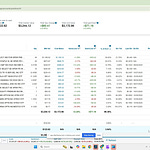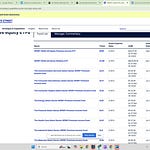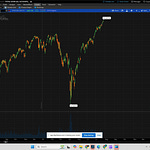My personal Substack Podcast where I talk about finance topics that fascinate me. I hope you enjoy!
Any podcast, webinar or similar presentation or discussion posted on Fenwick Financials' website or elsewhere on Luke Fenwick's Social Accounts has been prepared by Luke solely for information purposes and is not intended to function as a “research report.” In particular, this means that none of the podcasts or webinars or similar presentations or discussions are intended, nor do they contain sufficient information, to make a recommendation as to the advisability of investment in, or the value of, any security.
Additionally, any such content does not constitute or form part of, and should not be construed as, an offer to sell, or a solicitation of any offer to buy, or any recommendation with respect to, any securities. You should not base any investment decision on any such content involves risks, including the risk of loss.
The views expressed in any such content are based on the observations, experience and belief of the speakers, as well as assumptions made by, and information available to, them at the time such statements were made. These views are statements of the personal opinion of the speaker, and not statement of fact. There can be no guarantee that anything said on a podcast, webinar or similar presentation or discussion is correct, or that forward-looking statements will come to pass. Any such views are those of the individuals expressing them, and do not necessarily reflect the views of Fenwick Financial. Fenwick Financial may, in other circumstances and/or venues, take positions that are contrary to those proffered on any podcast, webinar or similar presentation or discussion.
References to third parties contained in any such content should not be considered a solicitation on behalf of, or an endorsement of, those entities by Fenwick Financial. Fenwick Financial or its affiliates may have business relationships with such third parties or other parties in the sectors discussed in such content. Participants may have a financial interest through investments or otherwise in one or more of the companies they discuss in any such podcast, webinar or similar presentation or discussion.
Any podcast, webinar or similar presentation or discussion that is published or otherwise presented on a third-party website does not constitute an endorsement of any third-party content published on such website.
The participants in any such podcast, webinar or similar presentation or discussion may cite data based on third-party content. While Fenwick Financial believes such content to be correct at the time used, and derived from reliable sources, Fenwick Financial makes no representation for the accuracy of any information provided by third-party content providers. Neither Fenwick Financial nor its affiliates guarantee the accuracy, adequacy, completeness, timeliness or availability of any content contained in any such podcast, webinar or similar presentation or discussion, and neither Fenwick Financial nor its affiliates are responsible for any errors or omissions (negligent or otherwise), regardless of the cause, or for the results obtained from the use of such content. In no event shall Fenwick Financial and its affiliates be liable for any damages, costs, expenses, legal fees, or losses (including lost income or lost profit and opportunity costs) in connection with any use of such content.
Nothing contained in any podcast, webinar or similar presentation constitutes financial, legal, tax or any other professional advice.
The information on this website or in the Firm's Brochure has NOT been approved or verified by the United States Securities and Exchange Commission or by any state securities authority. Additional information about Fenwick Financial also is available on the SEC’s website at www.adviserinfo.sec.gov. Registration does not imply a certain level of skill or training. There is no guarantee investing.
My personal Substack Podcast where I talk about finance topics that fascinate me. I hope you enjoy!
Any podcast, webinar or similar presentation or discussion posted on Fenwick Financials' website or elsewhere on Luke Fenwick's Social Accounts has been prepared by Luke solely for information purposes and is not intended to function as a “research report.” In particular, this means that none of the podcasts or webinars or similar presentations or discussions are intended, nor do they contain sufficient information, to make a recommendation as to the advisability of investment in, or the value of, any security.
Additionally, any such content does not constitute or form part of, and should not be construed as, an offer to sell, or a solicitation of any offer to buy, or any recommendation with respect to, any securities. You should not base any investment decision on any such content involves risks, including the risk of loss.
The views expressed in any such content are based on the observations, experience and belief of the speakers, as well as assumptions made by, and information available to, them at the time such statements were made. These views are statements of the personal opinion of the speaker, and not statement of fact. There can be no guarantee that anything said on a podcast, webinar or similar presentation or discussion is correct, or that forward-looking statements will come to pass. Any such views are those of the individuals expressing them, and do not necessarily reflect the views of Fenwick Financial. Fenwick Financial may, in other circumstances and/or venues, take positions that are contrary to those proffered on any podcast, webinar or similar presentation or discussion.
References to third parties contained in any such content should not be considered a solicitation on behalf of, or an endorsement of, those entities by Fenwick Financial. Fenwick Financial or its affiliates may have business relationships with such third parties or other parties in the sectors discussed in such content. Participants may have a financial interest through investments or otherwise in one or more of the companies they discuss in any such podcast, webinar or similar presentation or discussion.
Any podcast, webinar or similar presentation or discussion that is published or otherwise presented on a third-party website does not constitute an endorsement of any third-party content published on such website.
The participants in any such podcast, webinar or similar presentation or discussion may cite data based on third-party content. While Fenwick Financial believes such content to be correct at the time used, and derived from reliable sources, Fenwick Financial makes no representation for the accuracy of any information provided by third-party content providers. Neither Fenwick Financial nor its affiliates guarantee the accuracy, adequacy, completeness, timeliness or availability of any content contained in any such podcast, webinar or similar presentation or discussion, and neither Fenwick Financial nor its affiliates are responsible for any errors or omissions (negligent or otherwise), regardless of the cause, or for the results obtained from the use of such content. In no event shall Fenwick Financial and its affiliates be liable for any damages, costs, expenses, legal fees, or losses (including lost income or lost profit and opportunity costs) in connection with any use of such content.
Nothing contained in any podcast, webinar or similar presentation constitutes financial, legal, tax or any other professional advice.
The information on this website or in the Firm's Brochure has NOT been approved or verified by the United States Securities and Exchange Commission or by any state securities authority. Additional information about Fenwick Financial also is available on the SEC’s website at www.adviserinfo.sec.gov. Registration does not imply a certain level of skill or training. There is no guarantee investing.







